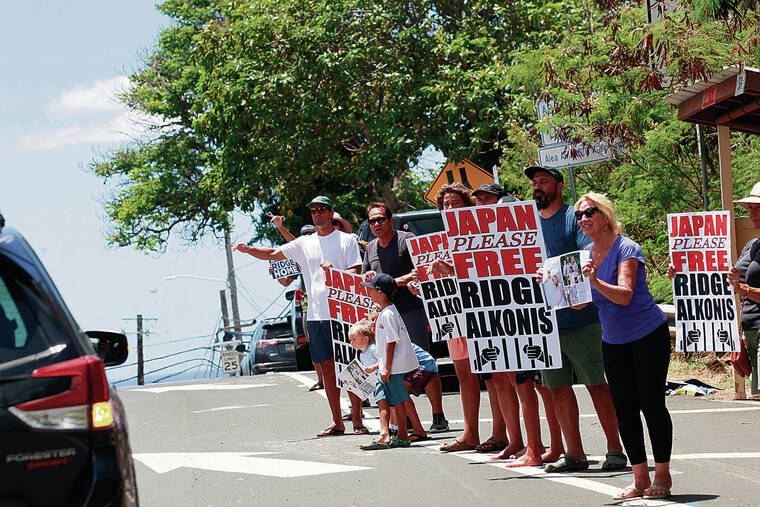Local family members of U.S. Navy Lt. Ridge Alkonis, who is currently imprisoned in Japan, drove down from the North Shore to picket outside Camp Smith on Wednesday and Thursday as White House national security adviser Jake Sullivan met there with Japanese and South Korean officials.
The 34-year-old Alkonis, a father of three, is serving a three-year prison term in connection with a car crash in rural Japan that left a Japanese man and woman dead. But family members insist that Alkonis has been the victim of a system that was serving vengeance rather than justice, resulting in an unusually harsh sentence.
“He’s got a lot of family members here on the island, over a hundred,” said 39-year-old Seth Hannemann, one of the Navy officer’s cousins on Oahu. “We are hoping that we can drum up enough noise that (U.S. and Japanese officials) will discuss reopening Ridge’s case so that he can be sent back home with his family.”
In May 2021 Alkonis was driving to his home in Japan with his family, following a hike on Mount Fuji. The group had ascended to an elevation of about 8,000 feet. While descending the area in their car, at about 1 p.m. Alkonis was talking to his oldest daughter. But something was wrong.
According to the family’s account, he suddenly lost consciousness midsentence and his vehicle veered into a parking lot, crashing into several parked cars. The crash pushed the cars against an 85-year-old woman and her 54-year-old son-in-law, both of whom died. The fatally injured woman’s daughter also was injured.
Alkonis was unconscious for several minutes after the crash as his wife and children tried to wake him. In June 2021, a neurologist told Alkonis that he had suffered from altitude sickness at the time of the crash. According to the U.S. National Library of Medicine, acute mountain sickness can affect people at altitudes of 8,000 feet or greater.
But the judge overseeing the case dismissed the diagnosis, arguing Alkonis had not traveled high enough to have suffered severe acute mountain sickness. In October, Alkonis was sentenced to three years in jail for negligent driving.
His supporters allege he was denied a lawyer during pretrial confinement and misled into signing documents stating that he had been tired that day as he was driving. They also allege that throughout the legal proceeding the family of victims pulled strings in an effort to see a harsh outcome in the case.
“The son-in-law of one of the victims is a prosecutor in the High Prosecutor’s Office, which largely supervises prosecutions in that area,” said Jonathan Franks, a spokesperson representing the Alkonis family. “There are markers that they exercised inappropriate influence … the daughter of one of the victims, who’s an attorney who represented the family, was seated right behind the prosecutors’ counsel table, it was a pretty clear message.”
The Navy officer’s family members maintain that Alkonis has tried to make amends with the victims’ family, frequently expressing remorse.
“The idea is particularly if you have an accident or something happens to causes harm, aside from the criminal case, you negotiate an out-of-court settlement with the bereaved family or families,” said Franks. “Normally, when a U.S. service member has an accident like this, the U.S. government pays the claim, it’s a claim against the United States at that point.”
But in this case, the family refused to accept payment from the U.S. government and insisted that Alkonis personally had to pay, to the tune of $1.65 million. His insurance paid half of it. Alkonis dug into his savings and with the help of friends and his extended family he managed to raise the remaining $800,000.
“They were told that if they (made the set payment), he would get a suspended sentence, which is the necessary condition for him to leave Japan” and for the Navy to bring Alkonis back to the United States, said Franks. “When you pay the settlement, normally the aggrieved party finds forgiveness. … The system is kind of built around people honoring cultural norms.”
In the Alkonis case, the victims’ family took the money, but then continued to press for harsh penalties, Franks said.
According to the Washington Post, of the 1,252 people in Japan charged with causing death through negligent driving in 2019, 4.6 percent — about 58 people — ended up serving prison time. The majority — 95.4 percent — received a suspended sentence.
“Our thoughts and our prayers completely go out to the family in this tragedy. It’s a totally tragic situation,” said Hannemann. However, he added, “It’s salt in the wound to further aggressively attack Ridge for an accident that haunts him and that happened under medical emergency circumstances.”
Family members said Alkonis has a deep connection with Japan that’s separate from his military service. Another cousin, Spencer Hannemann, said Alkonis first traveled there as a Mormon missionary. In addition to speaking the language, Alkonis loves Japan’s culture, history and its people, he said.
“If you were to talk to Ridge about the people, (he) absolutely loves them because of the time he spent with them,” said Spencer Hannemann. “He’s just a good dude and unfortunately this tragedy happened.”
While the picketing at Camp Smith was underway this week, the Navy officer’s wife, Brittany Alkonis, and their three children have been protesting in Washington, D.C., near the White House. There, the family is attempting to enlist President Joe Biden in helping to secure Alkonis’ release from prison.




